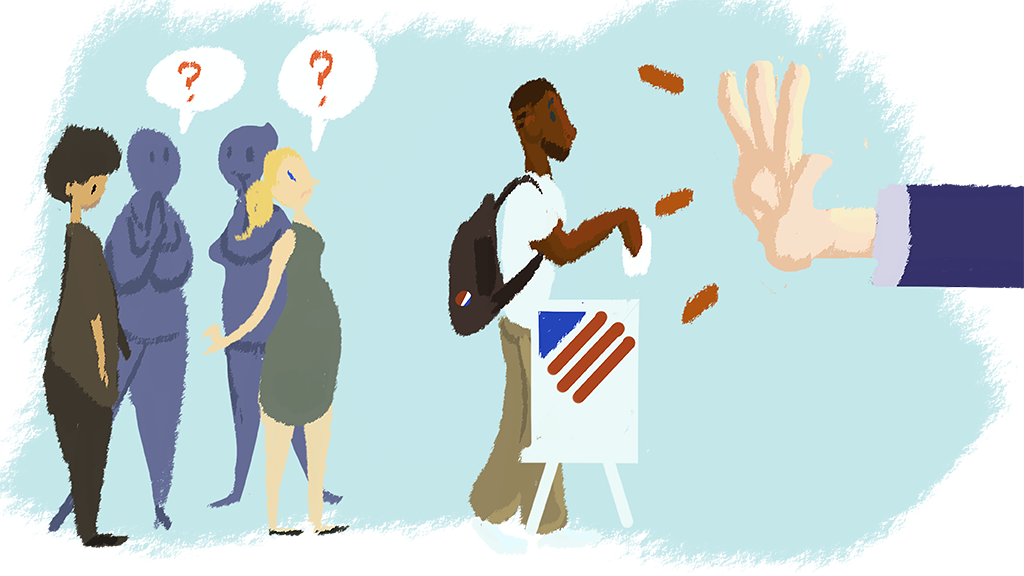Recent controversies in the Trump administration have renewed calls for young people to vote. #VoteThemOut is a national campaign aimed at young millennials and Gen Z-ers to vote in the midterms. From targeted ads on social media to celebrities making calls to register on the American Music Awards, the message is clear: we need to vote.
“RIT students have not historically been super engaged in national politics — even just in voting,” said Kerry Foxx, director for the Center for Leadership and Civic Engagement.
Who Votes?
The youth vote has always been low, particularly during midterm elections. A mere 28 percent of young adults ages 18–29 are estimated to vote compared to about 74 percent of senior citizens, according to recent election polls. So why don’t young people vote? Assistant Professor of Political Science Sarah Burns claimed that young voters' low sense of political efficacy is partly to blame.
“There’s two different kinds of self-perceptions. There’s internal efficacy, which means ‘I can shape my life. I can do what I want’ and external efficacy: ‘I can change my life. I can change the world,'" Burns said. "It tends to be [that] younger people, below the age of 29, are more internally focused and more interested in trying to shape their lives. So they spend less time on politics and don’t think their voice can affect change in an election.”
On the flip side, baby boomers who are generally retired and therefore have more free time can devote more of their personal attention to politics. Foxx pointed out that voting is habitual and many young voters have yet to establish the habit. Voting is also a tedious, analog process that requires a lot of paperwork and strict deadlines that are hard for millennials to follow. This is even harder in the case of absentee ballots.
Foxx also runs the ROAR the Vote initiative, which encourages students to vote. Much of their effort is dedicated to teaching students how to register and fill out the various paperwork.
One thing is for sure, as Foxx said — “Voting isn’t easy.”
"Voting is one of those inalienable rights and we need to make it as easy as possible to exercise it."
Who Can’t Vote?
During the 2016 presidential election, many politicians, including President Trump, claimed mass voter fraud had occurred during the elections. Although voter fraud in American elections is often blown out of proportion, Burns said the issue of voter suppression is a growing concern.
“State officials are sending out mail to people who live in their area, so if you’ve moved or you just didn’t look through your mail you may not get that letter. And if you don’t get that letter, then they’ll drop you off the list of registered voters," she said. "In a way this is how you disenfranchise voters. You think you’re registered and you show up for voting but you can’t vote because you’ve been knocked off registrations."
In 2013, the Supreme Court opted against renewing key parts from the Voting Rights Act, including a component that monitored southern elections to make sure racial discrimination had not occurred. Since the decision, some states have adopted the “use it or lose it” approach that automatically purges voters from registration if they are inactive for more than one election cycle. In the span of four years, Georgia state officials purged an estimated 1.3 million registered voters. That’s one in 10 registered voters, a decision that disproportionately affected millennial and black citizens.
It doesn’t stop there. States also institute other limitations on voting that furthers suppression, such as voter ID laws that require specific kinds of identification to vote. States like North Dakota have gone as far as requiring IDs that have street addresses to vote. This ruling almost entirely disenfranchises their native populations who live on reservations, as reserved lands do not have street addresses. In Alabama, an estimated 15 percent of African Americans have been permanently disenfranchised due to laws that ban convicted felons from voting for life, even after they’ve served their time.
“That’s being called the New Jim Crow ... it’s just a new way to disenfranchise traditionally-oppressed minorities,” Burns said.
Why Vote?
Fortunately, RIT provides many resources to increase student participation in elections. RIT will have a polling location on campus for the first time ever, which students can utilize if they are registered to vote with a local address. This is a step in the right direction, but Foxx emphasized that there’s a lot more that can be done to increase voter turnout.
“As a country we agree that voting is one of those inalienable rights and we need to make it as easy as possible to exercise it,” Foxx said.
A lot more can be done, from digitizing voting processes, to automatically registering all citizens when they turn 18, to eliminating the additional paperwork for absentee ballots, and the list goes on. However, it's important for students to get into the habit of voting regularly.
“Often I hear people say, ‘Voting doesn’t matter. My vote doesn’t mean anything or nothing will change if I vote,'" Foxx said. "My counter to that is if voting wasn’t important, then there wouldn’t be so much effort on the part of so many to keep people from voting."








